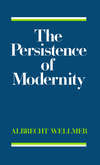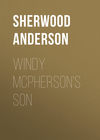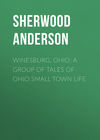Kitabı oku: «Triumph of the Egg, and Other Stories», sayfa 11
V
On the August evening as Rosalind sat on the porch before her father's house in Willow Springs, Walter Sayers came home from the factory by the river and to his wife's suburban garden. When the family had dined he came out to walk in the paths with the two children, boys, but they soon tired of his silence and went to join their mother. The young negro came along a path by the kitchen door and joined the party. Walter went to sit on a garden seat that was concealed behind bushes. He lighted a cigarette but did not smoke. The smoke curled quietly up through his fingers as it burned itself out.
Closing his eyes Walter sat perfectly still and tried not to think. The soft evening shadows began presently to close down and around him. For a long time he sat thus motionless, like a carved figure placed on the garden bench. He rested. He lived and did not live. The intense body, usually so active and alert, had become a passive thing. It was thrown aside, on to the bench, under the bush, to sit there, waiting to be reinhabited.
This hanging suspended between consciousness and unconsciousness was a thing that did not happen often. There was something to be settled between himself and a woman and the woman had gone away. His whole plan of life had been disturbed. Now he wanted to rest. The details of his life were forgotten. As for the woman he did not think of her, did not want to think of her. It was ridiculous that he needed her so much. He wondered if he had ever felt that way about Cora, his wife. Perhaps he had. Now she was near him, but a few yards away. It was almost dark but she with the negro remained at work, digging in the ground—somewhere near—caressing the soil, making things grow.
When his mind was undisturbed by thoughts and lay like a lake in the hills on a quiet summer evening little thoughts did come. "I want you as a lover—far away. Keep yourself far away." The words trailed through his mind as the smoke from the cigarette trailed slowly upwards through his fingers. Did the words refer to Rosalind Wescott? She had been gone from him three days. Did he hope she would never come back or did the words refer to his wife?
His wife's voice spoke sharply. One of the children in playing about, had stepped on a plant. "If you are not careful I shall have to make you stay out of the garden altogether." She raised her voice and called, "Marian!" A maid came from the house and took the children away. They went along the path toward the house protesting. Then they ran back to kiss their mother. There was a struggle and then acceptance. The kiss was acceptance of their fate—to obey. "O, Walter," the mother's voice called, but the man on the bench did not answer. Tree toads began to cry. "The kiss is acceptance. Any physical contact with another is acceptance," he reflected.
The little voices within Walter Sayers were talking away at a great rate. Suddenly he wanted to sing. He had been told that his voice was small, not of much account, that he would never be a singer. It was quite true no doubt but here, in the garden on the quiet summer night, was a place and a time for a small voice. It would be like the voice within himself that whispered sometimes when he was quiet, relaxed. One evening when he had been with the woman, Rosalind, when he had taken her into the country in his car, he had suddenly felt as he did now. They sat together in the car that he had run into a field. For a long time they had remained silent. Some cattle came and stood nearby, their figures soft in the night. Suddenly he had felt like a new man in a new world and had begun to sing. He sang one song over and over, then sat in silence for a time and after that drove out of the field and through a gate into the road. He took the woman back to her place in the city.
In the quiet of the garden on the summer evening he opened his lips to sing the same song. He would sing with the tree toad hidden away in the fork of a tree somewhere. He would lift his voice up from the earth, up into the branches, of trees, away from the ground in which people were digging, his wife and the young negro.
The song did not come. His wife began speaking and the sound of her voice took away the desire to sing. Why had she not, like the other woman, remained silent?
He began playing a game. Sometimes, when he was alone the thing happened to him that had now happened. His body became like a tree or a plant. Life ran through it unobstructed. He had dreamed of being a singer but at such a moment he wanted also to be a dancer. That would have been sweetest of all things—to sway like the tops of young trees when a wind blew, to give himself as grey weeds in a sunburned field gave themself to the influence of passing shadows, changing color constantly, becoming every moment something new, to live in life and in death too, always to live, to be unafraid of life, to let it flow through his body, to let the blood flow through his body, not to struggle, to offer no resistance, to dance.
Walter Sayers' children had gone into the house with the nurse girl Marian. It had become too dark for his wife to dig in the garden. It was August and the fruitful time of the year for farms and gardens had come, but his wife had forgotten fruitfulness. She was making plans for another year. She came along the garden path followed by the negro. "We will set out strawberry plants there," she was saying. The soft voice of the young negro murmured his assent. It was evident the young man lived in her conception of the garden. His mind sought out her desire and gave itself.
The children Walter Sayers had brought into life through the body of his wife Cora had gone into the house and to bed. They bound him to life, to his wife, to the garden where he sat, to the office by the riverside in the city.
They were not his children. Suddenly he knew that quite clearly. His own children were quite different things. "Men have children just as women do. The children come out of their bodies. They play about," he thought. It seemed to him that children, born of his fancy, were at that very moment playing about the bench where he sat. Living things that dwelt within him and that had at the same time the power to depart out of him were now running along paths, swinging from the branches of trees, dancing in the soft light.
His mind sought out the figure of Rosalind Wescott. She had gone away, to her own people in Iowa. There had been a note at the office saying she might be gone for several days. Between himself and Rosalind the conventional relationship of employer and employee had long since been swept quite away. It needed something in a man he did not possess to maintain that relationship with either men or women.
At the moment he wanted to forget Rosalind. In her there was a struggle going on. The two people had wanted to be lovers and he had fought against that. They had talked about it. "Well," he said, "it will not work out. We will bring unnecessary unhappiness upon ourselves."
He had been honest enough in fighting off the intensification of their relationship. "If she were here now, in this garden with me, it wouldn't matter. We could be lovers and then forget about being lovers," he told himself.
His wife came along the path and stopped nearby. She continued talking in a low voice, making plans for another year of gardening. The negro stood near her, his figure making a dark wavering mass against the foliage of a low growing bush. His wife wore a white dress. He could see her figure quite plainly. In the uncertain light it looked girlish and young. She put her hand up and took hold of the body of a young tree. The hand became detached from her body. The pressure of her leaning body made the young tree sway a little. The white hand moved slowly back and forth in space.
Rosalind Wescott had gone home to tell her mother of her love. In her note she had said nothing of that but Walter Sayers knew that was the object of her visit to the Iowa town. It was on odd sort of thing to try to do—to tell people of love, to try to explain it to others.
The night was a thing apart from Walter Sayers, the male being sitting in silence in the garden. Only the children of his fancy understood it. The night was a living thing. It advanced upon him, enfolded him. "Night is the sweet little brother of Death," he thought.
His wife stood very near. Her voice was soft and low and the voice of the negro when he answered her comments on the future of the garden was soft and low. There was music in the negro's voice, perhaps a dance in it. Walter remembered about him.
The young negro had been in trouble before he came to the Sayers. He had been an ambitious young black and had listened to the voices of people, to the voices that filled the air of America, rang through the houses of America. He had wanted to get on in life and had tried to educate himself. The black had wanted to be a lawyer.
How far away he had got from his own people, from the blacks of the African forests! He had wanted to be a lawyer in a city in America. What a notion!
Well he had got into trouble. He had managed to get through college and had opened a law office. Then one evening he went out to walk and chance led him into a street where a woman, a white woman, had been murdered an hour before. The body of the woman was found and then he was found walking in the street. Mrs. Sayers' brother, a lawyer, had saved him from being punished as a murderer and after the trial, and the young negro's acquittal, had induced his sister to take him as gardener. His chances as a professional man in the city were no good. "He has had a terrible experience and has just escaped by a fluke" the brother had said. Cora Sayers had taken the young man. She had bound him to herself, to her garden.
It was evident the two people were bound together. One cannot bind another without being bound. His wife had no more to say to the negro who went away along the path that led to the kitchen door. He had a room in a little house at the foot of the garden. In the room he had books and a piano. Sometimes in the evening he sang. He was going now to his place. By educating himself he had cut himself off from his own people.
Cora Sayers went into the house and Walter sat alone. After a time the young negro came silently down the path. He stopped by the tree where a moment before the white woman had stood talking to him. He put his hand on the trunk of the young tree where her hand had been and then went softly away. His feet made no sound on the garden path.
An hour passed. In his little house at the foot of the garden the negro began to sing softly. He did that sometimes in the middle of the night. What a life he had led too! He had come away from his black people, from the warm brown girls with the golden colors playing through the blue black of their skins and had worked his way through a Northern college, had accepted the patronage of impertinent people who wanted to uplift the black race, had listened to them, had bound himself to them, had tried to follow the way of life they had suggested.
Now he was in the little house at the foot of the Sayers' garden. Walter remembered little things his wife had told him about the man. The experience in the court room had frightened him horribly and he did not want to go off the Sayers' place. Education, books had done something to him. He could not go back to his own people. In Chicago, for the most part, the blacks lived crowded into a few streets on the South Side. "I want to be a slave," he had said to Cora Sayers. "You may pay me money if it makes you feel better but I shall have no use for it. I want to be your slave. I would be happy if I knew I would never have to go off your place."
The black sang a low voiced song. It ran like a little wind on the surface of a pond. It had no words. He had remembered the song from his father who had got it from his father. In the South, in Alabama and Mississippi the blacks sang it when they rolled cotton bales onto the steamers in the rivers. They had got it from other rollers of cotton bales long since dead. Long before there were any cotton bales to roll black men in boats on rivers in Africa had sung it. Young blacks in boats floated down rivers and came to a town they intended to attack at dawn. There was bravado in singing the song then. It was addressed to the women in the town to be attacked and contained both a caress and a threat. "In the morning your husbands and brothers and sweethearts we shall kill. Then we shall come into your town to you. We shall hold you close. We shall make you forget. With our hot love and our strength we shall make you forget." That was the old significance of the song.
Walter Sayers remembered many things. On other nights when the negro sang and when he lay in his room upstairs in the house, his wife came to him. There were two beds in their room. She sat upright in her bed. "Do you hear, Walter?" she asked. She came to sit on his bed, sometimes she crept into his arms. In the African villages long ago when the song floated up from the river men arose and prepared for battle. The song was a defiance, a taunt. That was all gone now. The young negro's house was at the foot of the garden and Walter with his wife lay upstairs in the larger house situated on high ground. It was a sad song, filled with race sadness. There was something in the ground that wanted to grow, buried deep in the ground. Cora Sayers understood that. It touched something instinctive in her. Her hand went out and touched, caressed her husband's face, his body. The song made her want to hold him tight, possess him.
The night was advancing and it grew a little cold in the garden. The negro stopped singing. Walter Sayers arose and went along the path toward the house but did not enter. Instead he went through a gate into the road and along the suburban streets until he got into the open country. There was no moon but the stars shone brightly. For a time he hurried along looking back as though afraid of being followed, but when he got out into a broad flat meadow he went more slowly. For an hour he walked and then stopped and sat on a tuft of dry grass. For some reason he knew he could not return to his house in the suburb that night. In the morning he would go to the office and wait there until Rosalind came. Then? He did not know what he would do then. "I shall have to make up some story. In the morning I shall have to telephone Cora and make up some silly story," he thought. It was an absurd thing that he, a grown man, could not spend a night abroad, in the fields without the necessity of explanations. The thought irritated him and he arose and walked again. Under the stars in the soft night and on the wide flat plains the irritation soon went away and he began to sing softly, but the song he sang was not the one he had repeated over and over on that other night when he sat with Rosalind in the car and the cattle came. It was the song the negro sang, the river song of the young black warriors that slavery had softened and colored with sadness. On the lips of Walter Sayers the song had lost much of its sadness. He walked almost gaily along and in the song that flowed from his lips there was a taunt, a kind of challenge.
VI
At the end of the short street on which the Wescotts lived in Willow Springs there was a cornfield. When Rosalind was a child it was a meadow and beyond was an orchard.
On summer afternoons the child often went there to sit alone on the banks of a tiny stream that wandered away eastward toward Willow Creek, draining the farmer's fields on the way. The creek had made a slight depression in the level contour of the land and she sat with her back against an old apple tree and with her bare feet almost touching the water. Her mother did not permit her to run bare footed through the streets but when she got into the orchard she took her shoes off. It gave her a delightful naked feeling.
Overhead and through the branches the child could see the great sky. Masses of white clouds broke into fragments and then the fragments came together again. The sun ran in behind one of the cloud masses and grey shadows slid silently over the face of distant fields. The world of her child life, the Wescott household, Melville Stoner sitting in his house, the cries of other children who lived in her street, all the life she knew went far away. To be there in that silent place was like lying awake in bed at night only in some way sweeter and better. There were no dull household sounds and the air she breathed was sweeter, cleaner. The child played a little game. All the apple trees in the orchard were old and gnarled and she had given all the trees names. There was one fancy that frightened her a little but was delicious too. She fancied that at night when she had gone to bed and was asleep and when all the town of Willow Springs had gone to sleep the trees came out of the ground and walked about. The grasses beneath the trees, the bushes that grew beside the fence—all came out of the ground and ran madly here and there. They danced wildly. The old trees, like stately old men, put their heads together and talked. As they talked their bodies swayed slightly—back and forth, back and forth. The bushes and flowering weeds ran in great circles among the little grasses. The grasses hopped straight up and down.
Sometimes when she sat with her back against the tree on warm bright afternoons the child Rosalind had played the game of dancing-life until she grew afraid and had to give it up. Nearby in the fields men were cultivating corn. The breasts of the horses and their wide strong shoulders pushed the young corn aside and made a low rustling sound. Now and then a man's voice was raised in a shout. "Hi, there you Joe! Get in there Frank!" The widow of the hens owned a little woolly dog that occasionally broke into a spasm of barking, apparently without cause, senseless, eager, barking. Rosalind shut all the sounds out. She closed her eyes and struggled, trying to get into the place beyond human sounds. After a time her desire was accomplished. There was a low sweet sound like the murmuring of voices far away. Now the thing was happening. With a kind of tearing sound the trees came up to stand on top of the ground. They moved with stately tread toward each other. Now the mad bushes and the flowering weeds came running, dancing madly, now the joyful grasses hopped. Rosalind could not stay long in her world of fancy. It was too mad, too joyful. She opened her eyes and jumped to her feet. Everything was all right. The trees stood solidly rooted in the ground, the weeds and bushes had gone back to their places by the fence, the grasses lay asleep on the ground. She felt that her father and mother, her brother, everyone she knew would not approve of her being there among them. The world of dancing life was a lovely but a wicked world. She knew. Sometimes she was a little mad herself and then she was whipped or scolded. The mad world of her fancy had to be put away. It frightened her a little. Once after the thing appeared she cried, went down to the fence crying. A man who was cultivating corn came along and stopped his horses. "What's the matter?" he asked sharply. She couldn't tell him so she told a lie. "A bee stung me," she said. The man laughed. "It'll get well. Better put on your shoes," he advised.
The time of the marching trees and the dancing grasses was in Rosalind's childhood. Later when she had graduated from the Willow Springs High School and had the three years of waiting about the Wescott house before she went to the city she had other experiences in the orchard. Then she had been reading novels and had talked with other young women. She knew many things that after all she did not know. In the attic of her mother's house there was a cradle in which she and her brother had slept when they were babies. One day she went up there and found it. Bedding for the cradle was packed away in a trunk and she took it out. She arranged the cradle for the reception of a child. Then after she did it she was ashamed. Her mother might come up the attic stairs and see it. She put the bedding quickly back into the trunk and went down stairs, her cheeks burning with shame.
What a confusion! One day she went to the house of a schoolgirl friend who was about to be married. Several other girls came and they were all taken into a bedroom where the bride's trousseau was laid out on a bed. What soft lovely things! All the girls went forward and stood over them, Rosalind among them. Some of the girls were shy, others bold. There was one, a thin girl who had no breasts. Her body was flat like a door and she had a thin sharp voice and a thin sharp face. She began to cry out strangely. "How sweet, how sweet, how sweet," she cried over and over. The voice was not like a human voice. It was like something being hurt, an animal in the forest, far away somewhere by itself, being hurt. Then the girl dropped to her knees beside the bed and began to weep bitterly. She declared she could not bear the thought of her schoolgirl friend being married. "Don't do it! O, Mary don't do it!" she pleaded. The other girls laughed but Rosalind couldn't stand it. She hurried out of the house.
That was one thing that had happened to Rosalind and there were other things. Once she saw a young man on the street. He clerked in a store and Rosalind did not know him. However her fancy played with the thought that she had married him. Her own thoughts made her ashamed.
Everything shamed her. When she went into the orchard on summer afternoons she sat with her back against the apple tree and took off her shoes and stockings just as she had when she was a child, but the world of her childhood fancy was gone, nothing could bring it back.
Rosalind's body was soft but all her flesh was firm and strong. She moved away from the tree and lay on the ground. She pressed her body down into the grass, into the firm hard ground. It seemed to her that her mind, her fancy, all the life within her, except just her physical life, went away. The earth pressed upwards against her body. Her body was pressed against the earth. There was darkness. She was imprisoned. She pressed against the walls of her prison. Everything was dark and there was in all the earth silence. Her fingers clutched a handful of the grasses, played in the grasses.
Then she grew very still but did not sleep. There was something that had nothing to do with the ground beneath her or the trees or the clouds in the sky, that seemed to want to come to her, come into her, a kind of white wonder of life.
The thing couldn't happen. She opened her eyes and there was the sky overhead and the trees standing silently about. She went again to sit with her back against one of the trees. She thought with dread of the evening coming on and the necessity of going out of the orchard and to the Wescott house. She was weary. It was the weariness that made her appear to others a rather dull stupid young woman. Where was the wonder of life? It was not within herself, not in the ground. It must be in the sky overhead. Presently it would be night and the stars would come out. Perhaps the wonder did not really exist in life. It had something to do with God. She wanted to ascend upwards, to go at once up into God's house, to be there among the light strong men and women who had died and left dullness and heaviness behind them on the earth. Thinking of them took some of her weariness away and sometimes she went out of the orchard in the late afternoon walking almost lightly. Something like grace seemed to have come into her tall strong body.
* * * * *
Rosalind had gone away from the Wescott house and from Willow Springs, Iowa, feeling that life was essentially ugly. In a way she hated life and people. In Chicago sometimes it was unbelievable how ugly the world had become. She tried to shake off the feeling but it clung to her. She walked through the crowded streets and the buildings were ugly. A sea of faces floated up to her. They were the faces of dead people. The dull death that was in them was in her also. They too could not break through the walls of themselves to the white wonder of life. After all perhaps there was no such thing as the white wonder of life. It might be just a thing of the mind. There was something essentially dirty about life. The dirt was on her and in her. Once as she walked at evening over the Rush Street bridge to her room on the North Side she looked up suddenly and saw the chrysoprase river running inland from the lake. Near at hand stood a soap factory. The men of the city had turned the river about, made it flow inland from the lake. Someone had erected a great soap factory there near the river's entrance to the city, to the land of men. Rosalind stopped and stood looking along the river toward the lake. Men and women, wagons, automobiles rushed past her. They were dirty. She was dirty. "The water of an entire sea and millions of cakes of soap will not wash me clean," she thought. The dirtiness of life seemed a part of her very being and an almost overwhelming desire to climb upon the railing of the bridge and leap down into the chrysoprase river swept over her. Her body trembled violently and putting down her head and staring at the flooring of the bridge she hurried away.
* * * * *
And now Rosalind, a grown woman, was in the Wescott house at the supper table with her father and mother. None of the three people ate. They fussed about with the food Ma Wescott had prepared. Rosalind looked at her mother and thought of what Melville Stoner had said.
"If I wanted to write I'd do something. I'd tell what everyone thought. It would startle people, frighten them a little, eh? I would tell what you have been thinking this afternoon while you walked here on this railroad track with me. I would tell what your mother has been thinking at the same time and what she would like to say to you."
What had Rosalind's mother been thinking all through the three days since her daughter had so unexpectedly come home from Chicago? What did mothers think in regard to the lives led by their daughters? Had mothers something of importance to say to daughters and if they did when did the time come when they were ready to say it?
She looked at her mother sharply. The older woman's face was heavy and sagging. She had grey eyes like Rosalind's but they were dull like the eyes of a fish lying on a slab of ice in the window of a city meat market. The daughter was a little frightened by what she saw in her mother's face and something caught in her throat. There was an embarrassing moment. A strange sort of tenseness came into the air of the room and all three people suddenly got up from the table.
Rosalind went to help her mother with the dishes and her father sat in a chair by a window and read a paper. The daughter avoided looking again into her mother's face. "I must gather myself together if I am to do what I want to do," she thought. It was strange—in fancy she saw the lean bird-like face of Melville Stoner and the eager tired face of Walter Sayers floating above the head of her mother who leaned over the kitchen sink, washing the dishes. Both of the men's faces sneered at her. "You think you can but you can't. You are a young fool," the men's lips seemed to be saying.
Rosalind's father wondered how long his daughter's visit was to last. After the evening meal he wanted to clear out of the house, go up town, and he had a guilty feeling that in doing so he was being discourteous to his daughter. While the two women washed the dishes he put on his hat and going into the back yard began chopping wood. Rosalind went to sit on the front porch. The dishes were all washed and dried but for a half hour her mother would putter about in the kitchen. She always did that. She would arrange and rearrange, pick up dishes and put them down again. She clung to the kitchen. It was as though she dreaded the hours that must pass before she could go upstairs and to bed and asleep, to fall into the oblivion of sleep.
When Henry Wescott came around the corner of the house and confronted his daughter he was a little startled. He did not know what was the matter but he felt uncomfortable. For a moment he stopped and looked at her. Life radiated from her figure. A fire burned in her eyes, in her grey intense eyes. Her hair was yellow like cornsilk. She was, at the moment, a complete, a lovely daughter of the cornlands, a being to be loved passionately, completely by some son of the cornlands—had there been in the land a son as alive as this daughter it had thrown aside. The father had hoped to escape from the house unnoticed. "I'm going up town a little while," he said hesitatingly. Still he lingered a moment. Some old sleeping thing awoke in him, was awakened in him by the startling beauty of his daughter. A little fire flared up among the charred rafters of the old house that was his body. "You look pretty, girly," he said sheepishly and then turned his back to her and went along the path to the gate and the street.
Rosalind followed her father to the gate and stood looking as he went slowly along the short street and around a corner. The mood induced in her by her talk with Melville Stoner had returned. Was it possible that her father also felt as Melville Stoner sometimes did? Did loneliness drive him to the door of insanity and did he also run through the night seeking some lost, some hidden and half forgotten loveliness?
When her father had disappeared around the corner she went through the gate and into the street. "I'll go sit by the tree in the orchard until mother has finished puttering about the kitchen," she thought.
Henry Wescott went along the streets until he came to the square about the court house and then went into Emanuel Wilson's Hardware Store. Two or three other men presently joined him there. Every evening he sat among these men of his town saying nothing. It was an escape from his own house and his wife. The other men came for the same reason. A faint perverted kind of male fellowship was achieved. One of the men of the party, a little old man who followed the housepainters trade, was unmarried and lived with his mother. He was himself nearing the age of sixty but his mother was still alive. It was a thing to be wondered about. When in the evening the house painter was a trifle late at the rendezvous a mild flurry of speculation arose, floated in the air for a moment and then settled like dust in an empty house. Did the old house painter do the housework in his own house, did he wash the dishes, cook the food, sweep and make the beds or did his feeble old mother do these things? Emanuel Wilson told a story he had often told before. In a town in Ohio where he had lived as a young man he had once heard a tale. There was an old man like the house painter whose mother was also still alive and lived with him. They were very poor and in the winter had not enough bedclothes to keep them both warm. They crawled into a bed together. It was an innocent enough matter, just like a mother taking her child into her bed.















